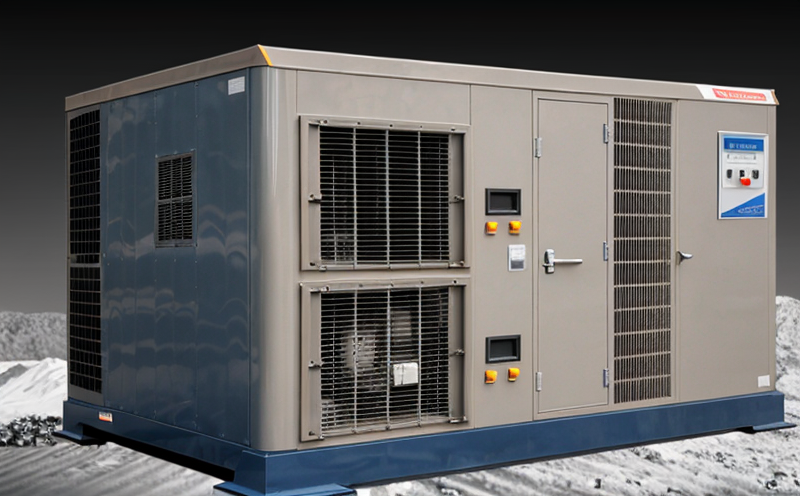ASTM D5373 Thermal Endurance Testing of Polymers
The ASTM D5373 thermal endurance testing method is a critical procedure used to evaluate the resistance and durability of polymers under high-temperature conditions. This test simulates real-world operating environments where materials are subjected to prolonged exposure to elevated temperatures, which can cause degradation or failure over time.
This standard, published by ASTM International, provides detailed protocols for conducting thermal endurance tests on various polymer types used in semiconductor and microchip applications. The primary objective is to assess the long-term performance of these polymers under high-temperature conditions that may be encountered during manufacturing processes or end-use environments.
During this testing process, specimens are exposed to a controlled environment where temperature cycles are maintained between specified upper and lower limits for predetermined durations. This approach helps in understanding how well the polymer can withstand thermal stresses without compromising its integrity or functionality.
The test setup typically involves placing small samples of the polymer in an oven that maintains precise temperature variations according to ASTM D5373 specifications. The cycle might include phases like heating up, holding at a specified temperature, cooling down again, and repeating this sequence multiple times over several days or weeks depending on the specific requirements set by the client.
After completing all cycles as per the prescribed procedure outlined in ASTM D5373, the integrity of each sample is inspected for any signs of damage such as discoloration, cracking, shrinking, warping, or loss of mechanical properties. If a significant portion (typically more than 10%) of samples exhibit unacceptable levels of degradation after testing, then it indicates that the polymer does not meet quality standards required for use in semiconductor manufacturing processes.
Understanding the results from ASTM D5373 testing plays a crucial role in ensuring reliable performance across various applications within the semiconductor industry. For instance, if you're developing new types of encapsulants or adhesives for microchips, knowing how they respond to high temperatures can help optimize product design and improve overall reliability.
By adhering strictly to ASTM D5373 guidelines during testing, laboratories ensure accurate assessments that align with industry best practices. This consistency helps maintain trust among clients who rely on these tests as part of their quality assurance processes before committing resources towards large-scale production runs or further development efforts.
Benefits
Conducting ASTM D5373 thermal endurance testing offers numerous advantages for organizations involved in the semiconductor and microchip industries:
- Enhanced Product Quality: By identifying potential weaknesses early on through rigorous testing, companies can improve their product offerings by selecting superior materials that better withstand harsh environmental conditions.
- Informed Decision-Making: Accurate data provided by ASTM D5373 tests enables informed decisions regarding material selection and process optimization, leading to cost savings and reduced waste throughout the supply chain.
- Risk Mitigation: Early detection of issues helps mitigate risks associated with using substandard materials that could lead to failures during critical stages of production or use by end customers.
- Compliance Assurance: Ensuring compliance with international standards like ASTM D5373 demonstrates a commitment to maintaining high-quality standards, thereby enhancing brand reputation and fostering customer confidence.
- Innovation Support: Understanding how different polymers behave under thermal stress can inspire innovative approaches in developing novel materials specifically tailored for advanced semiconductor applications.
The benefits extend beyond just manufacturing; they also contribute significantly to the overall sustainability goals of companies by promoting the use of environmentally friendly and durable materials. This approach not only reduces operational costs but also aligns with growing consumer demand for eco-friendly products.
Quality and Reliability Assurance
ASTM D5373 thermal endurance testing is an essential component of a comprehensive quality assurance program in the semiconductor industry. It ensures that materials used are not only capable of withstanding high temperatures but also remain stable throughout their lifecycle.
During ASTM D5373 testing, strict adherence to temperature cycling protocols guarantees accurate assessment of polymer performance under controlled conditions. This consistency is vital for ensuring reliable results across multiple samples and batches produced by different manufacturers or suppliers.
By incorporating ASTM D5373 into your quality assurance process, you can:
- Identify discrepancies early in the development cycle, preventing costly reworks later on;
- Increase customer satisfaction through consistently high-quality products;
- Educate stakeholders about material behavior under thermal stress conditions, fostering a deeper understanding of product design requirements.
The data obtained from ASTM D5373 tests provides valuable insights into the durability and reliability of polymers used in semiconductor manufacturing. This information is crucial for making informed decisions regarding raw materials procurement, process optimization, and long-term maintenance strategies. Ultimately, integrating such testing into your quality assurance framework helps build trust with key partners while driving continuous improvement within your organization.
Competitive Advantage and Market Impact
The ability to accurately test and validate the thermal endurance of polymers used in semiconductor manufacturing provides significant competitive advantages for companies operating in this sector. By leveraging ASTM D5373 testing capabilities, firms can:
- Stay ahead of regulatory changes by ensuring compliance with current standards;
- Earn recognition from customers seeking reliable partners who prioritize product quality and sustainability;
- Differentiate themselves in crowded markets by offering superior products backed by robust testing protocols;
- Promote innovation through continuous research into new materials that better meet evolving industry needs.
Moreover, companies that invest in ASTM D5373 testing demonstrate a strong commitment to excellence, which resonates positively with both internal teams and external stakeholders. Such efforts not only enhance corporate image but also contribute to long-term success by fostering trust among clients and investors alike.
In today's rapidly changing technological landscape, staying competitive requires more than just delivering functional products; it involves ensuring they remain reliable even under extreme conditions. By prioritizing ASTM D5373 testing as part of your overall quality assurance strategy, you position yourself as a leader in the semiconductor industry while paving the way for future advancements.





